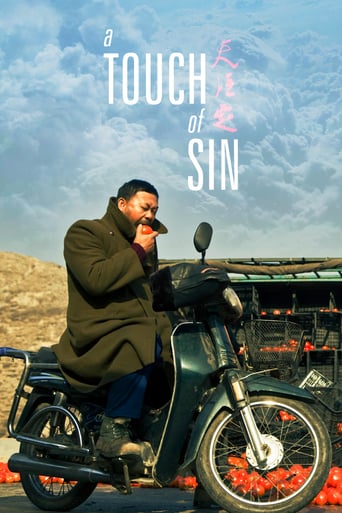Ensofter
Overrated and overhyped
Odelecol
Pretty good movie overall. First half was nothing special but it got better as it went along.
Salubfoto
It's an amazing and heartbreaking story.
Kirandeep Yoder
The joyful confection is coated in a sparkly gloss, bright enough to gleam from the darkest, most cynical corners.
MartinHafer
According to IMDb, this film is included in "1001 Movies You Must See Before You Die" by Steven Schneider. I, on the other hand, do NOT suggest you see the film as it's thoroughly depressing, nasty and awful! I need to perhaps write a book entitled "1001 god-awful films you must avoid at all costs" and include the movie in this!!The film is made up of several different stories that are linked, tenuously, together. The stories are all set in modern China and the film was jam packed full of graphic murders, attempted rape, suicide, robbery and the like. A few of the killings seem justified but many are just senseless and very bloody. Other than perhaps being a morality tale about how thoroughly corrupt and soulless modern China is, I really saw no purpose to the film. In fact, I found it all very repellent and awful from start to finish. A truly awful film that I never hope to see again.
kayasmus
I found this to be Jia's strongest film to date. The four short films that make up this movie are very much related in that they are based on real events, which makes the unfolding scenes seem surreal, but at the same time evoking great pathos for the protagonists.Going in there are some things to keep in mind. The title and events pay a bit of homage to A Touch of Zen, an older wuxia films, which also featured Buddhism as a key theme. In a Touch of Sin, any kind of faith in anyone just falls apart. There is no love, no happiness, and no success. Dreams are not achieved and even when the protagonists achieve their goals of revenge or justice, they are left bitter and empty. By using real events Jia is sending out a not so subtle message about how many people in China have lost themselves to greed, have suffered and worked hard to no avail. Living standards do not increase due to corruption, one character has lost his connection with his own family, a mistress begs a man to leave his wife, to be beaten up herself while it is implied that the husband is unscathed, and yet another will do anything to feed her child, including selling her body.Anyone who has been to China for long periods of time will have seen these events, or something similar, over and over again and it is the ending of the film that drives this message home. You have only yourself to blame repeated while the camera focuses on a group of blank faces, watching and enjoying a show. Jia is talking to all Chinese who just observe, and he seems passionate here to drive the message home, that they are to blame for how their lives have become. And they need to act if they want things to change.
dipesh parmar
Chinese film-maker Jia Zhang-ke's new film 'A Touch of Sin' is made up of four stories loosely connected to each other. <!--more-->Zhou San (Wang Baoqiang) introduces us to the first of the four characters, a quiet man who seems to have a lot to hide. As with the other characters, Zhou San works away from home and thus separated from his family and home. Dahai (Jiang Wu) tells another story, a coal miner who won't stop pestering everyone about how his boss sold off the mine and got rich while never distributing the wealth to the village. One too many outbursts leads to a chain of events which ends badly.The third story sees Hubei (Zhao Tao) working in a massage parlour as a receptionist, who is having an affair with a married man. Having waited so long for him to make up his mind, Hubei gives him 6 months to leave his wife. Troubles with work and her private life soon catch up with Hubei, as it does with the final character Xiao Hui (Luo Lanshan). The youngest of the four characters, Xiao Hui drifts from job to job, seemingly in a permanent state of flux. He left his last job through an act of cowardice, involving a work-related accident with a colleague. Permanently broke and unable to find his feet anywhere, Hubei finds the struggle of keeping a job and sending money to his mother difficult to fathom.'A Touch of Sin' exposes the four individuals struggles in modern China, revealing a growing discontent between the exploited working classes and the ruling elite which forces them to take measures into their own hands. Animals are metaphors for these people who are transported from place to place, who have no apparent control over their location or destiny. These lost souls are defined by a stark landscape of degradation, greed and corruption. There's nowhere to hide, each cannot continue with the life they've led, being controlled by others who gain everything and return very little. Each has to make a decision whether to become part of the system which will benefit themselves but lose all sense of morality and ethics, to avenge their ills, or to curl up and die.'A Touch of Sin' starts off well, Dahai's story is one which will probably interest you the most. But the film is too long, and suffers from a second half which doesn't quite match the tension and drama of the first half. Its a bleak and unforgiving film, such is the pessimism in Zhang- Ke's dehumanised China that there is simply nowhere to run. In one scene, one characters asks another if he ever feels like travelling abroad. "Why would I?" he replies. "Everywhere is broke. Foreigners come here now." Welcome to the new China.
Ilpo Hirvonen
After some moments of silence, the master of the sixth generation of Chinese filmmakers, Jia Zhangke returns with his newest feature "A Touch of Sin" (2013) which might just be his darkest work to date. It's an intriguing film of sheer brilliance told through the complexity of several, loosely connected stories about people in agony. While some fans of the director may be disappointed by the lack of clairvoyant lyric beauty, characteristic for example for "Still Life" (2006), others may find the narrative ambiguity and incoherence rather enriching. The film begins with an enigmatic scene at a deserted rural highway where a truck carrying tomatoes has fallen over. A cold sense of brutality breathes in the air. Soon the first characters are introduced and we learn that, in the same way as in "Still Life", "A Touch of Sin" is structured from different stories with different human fates. In brief, it tells the story of four random acts of violence in today's society.Although the stories lack obvious connection, they all share a few essential elements. First of all, they all escalate to an outburst of violence. Second, all of them are tales of social rootlessness and existential alienation. The latter remark is congruous with the fact that in all of Zhangke's films the general aspect meets the particular in a poignant fashion of chill and solitude. Individuals live in their personal prisons while the modernization of the society brings nothing but empty freedom. In other words, they live in spaces that are both private and public where they feel utterly detached. No one belongs anywhere in the Zhangke universe. Due to the complexity of several stories, the film also includes more than one central milieu. However, this seemingly arbitrary set of different settings of hotels and a coal miners' town do tell us about veritably similar subjects. All the spaces are haunted by the same problems. Such conflict of ambiguity and coherence should not frighten the spectator. Since instead of a straight-forward narrative with clear character delineation, Zhangke offers us a fascinatingly cynical cross-section of the contemporary Chinese society which is, on the one hand, characterized by economic boom to whose technological wonderland an individual may vanish, and, on the other, the tormenting but also comforting legacy of Mao. Modern Chinese way of life appears to Zhangke as something diverse -- as something that is in a constant state of change. Like in his previous features, Zhangke once again focuses on the transforming reality, the current flow, and its consequences on the individuals. Although this was already done to an extent in "Still Life" through the complexity of two overlapping stories, it also cast hope in humanity, whereas "A Touch of Sin" is far more pessimistic. Once again Zhangke's aesthetics of cinema is characterized by the elements of silence and emptiness in the images of loneliness and alienation. It is as though everything had died. Only violence is portrayed passionately, all the rest is understated. The violence in "A Touch of Sin" is raw and brutal, but essentially stripped. Above all, violence appears as a melancholic undertone of some kind which reveals the realities of the society. Even if the opaque and complex narrative of "A Touch of Sin" left the viewer speechless and unable to describe what he or she had just seen, there is always something profound to admire in Zhangke's cinema. In his films there is always that certain mood which is quite difficult to be put in words. In brief, it is a mood of emptiness, but also of utter richness.

